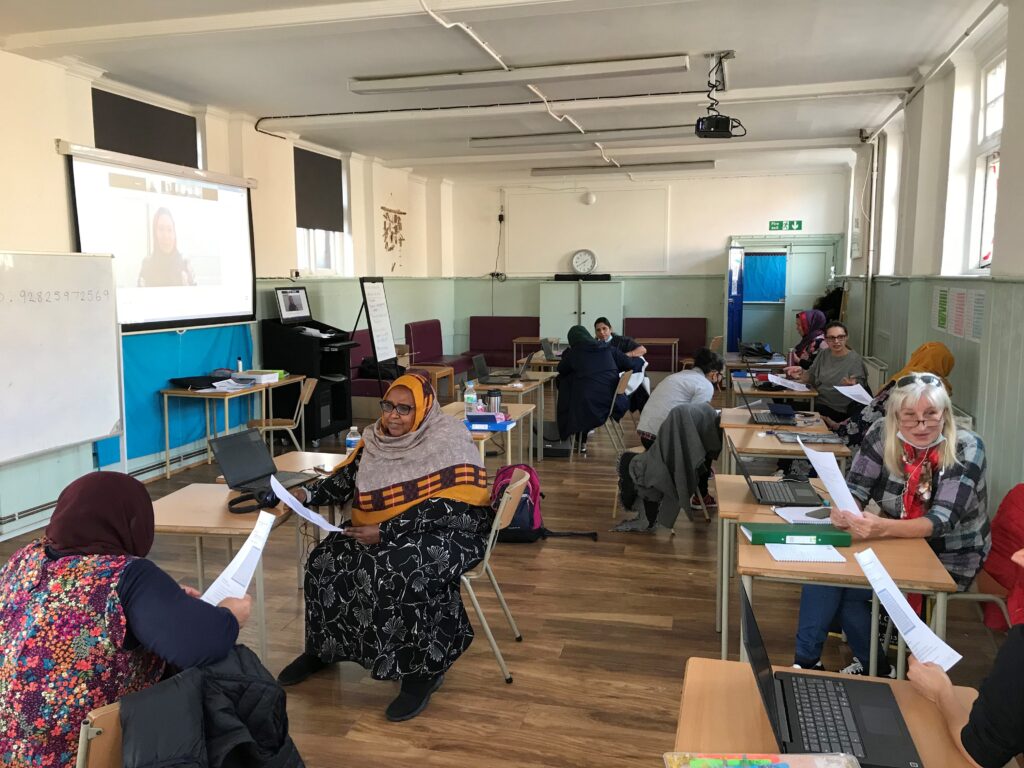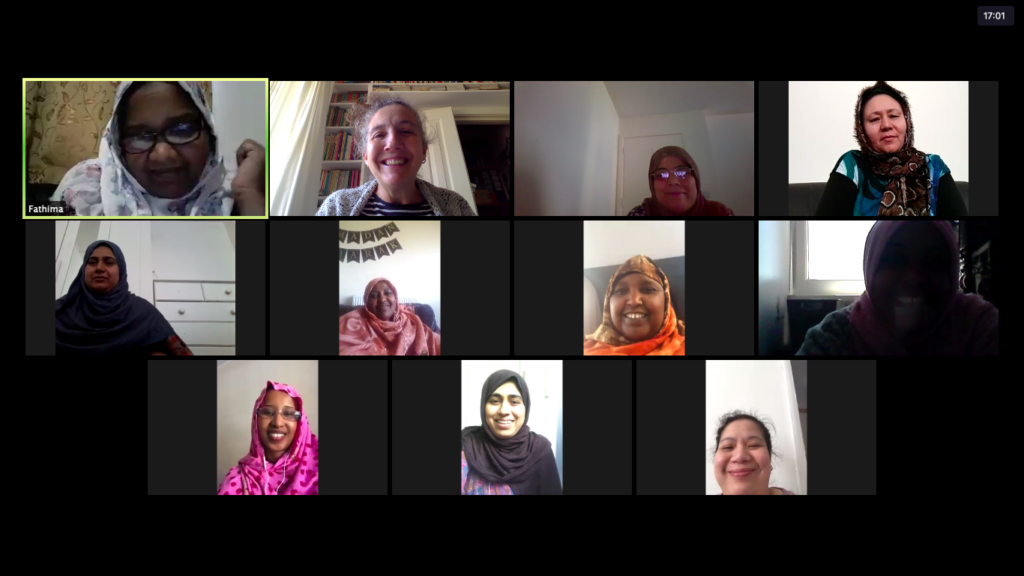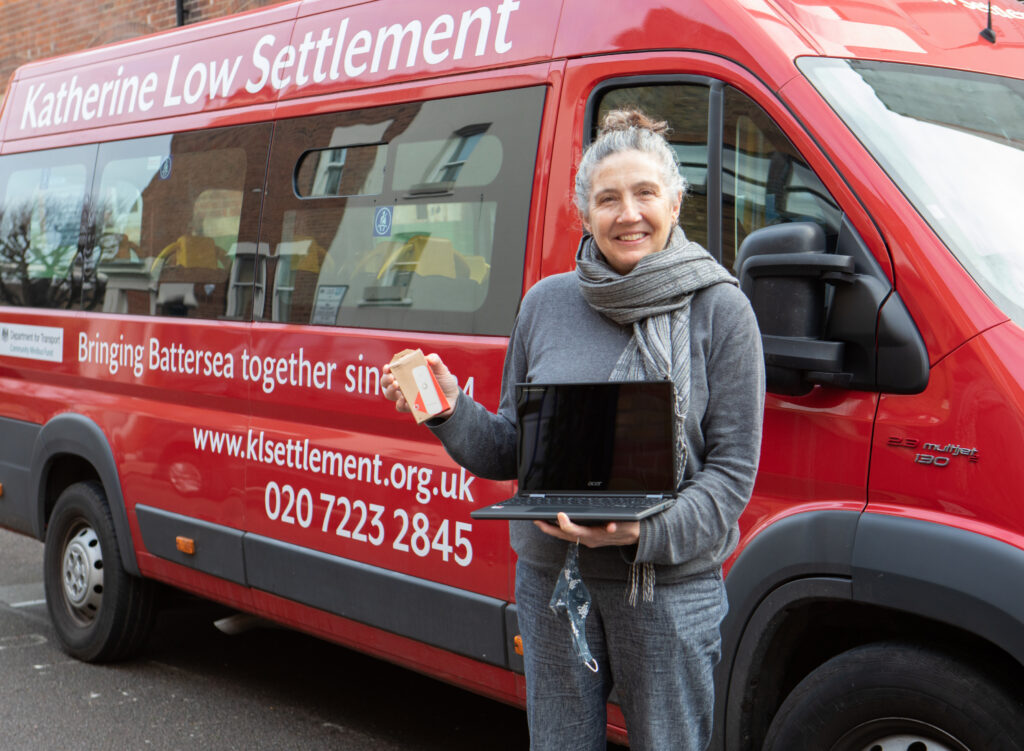One year on: ESOL (English) programme annual report 2020-21
Thanks to support from the National Lottery Community Fund and Wandsworth Council’s Lifelong Learning Department Katherine Low Settlement has been providing free English for Speakers of Other Languages (ESOL) courses for migrant and refugee communities in Wandsworth, over the last academic year (September 2020 – July 2021). A service we’ve provided since 1999. This enables our students to improve their English literacy and language across the four skills of speaking, listening, reading and writing.
This is a short report about what our ESOL team has achieved over the last academic year (2020-21).
Courses
- 8 courses running designed to teach students with different levels of English.
Numbers of students
- 128 students enrolled in the academic year (81% retention rate).
- 170 study places across our various classes of ESOL, ESOL waiting lists, Maths and IT. We have a study place for any student who wishes to study Maths, and presently 30 students a year can study IT.
Student Progression
- 97 students intend to progress/return in September 2021.
- Of those moving on from KLS:
- 3 moved onto employment Jan-Apr’20
- 1 moved into employment Aug’21, having gained Level 1 Reading and Writing
- 1 moved onto a Level 2 Teaching Assistant course, have gained L1 Functional skills English and Maths
- 1 moved onto Level 1 Childcare course in Further Education
- 2 ex-students on Level 2 Teaching Assistant course returned to complete element of WEX
- 1 student set up an online business selling crocheted dolls
- 1 student developed her own YouTube cooking channel which now has 32K subscribers.
Exams
- 56 exams entered for (Entry 1, 2, 3, Level 1 English SFL; E2, E3, L1, L2 Functional skills Maths) of which we had:
- 50 live exam achievements (including 2 Teacher Assessed Grade achievements)
- 4 fails
- 2 illness related no-shows

Covid Restrictions and Flexible Classes
In September 2020 we started the academic year with face-to-face classes – adjusting our teaching to Covid restrictions to include: desks 2 metres apart; larger classes split to avoid overcrowding with a blended learning approach (once we had worked out ways to do this); students picking up worksheets at appointed times when unable to attend in person; ensuring all students had a gmail email address, could access Google Classroom and were trained to use Zoom in the event of any further closures; and 1:1 laptop training for students.
Providing digital support
“I liked borrowing a laptop because now I’m learning about using a laptop for my future.” Aliya, one of our students
Last year (see Year 1 report) we reported the results of a digital access survey amongst our students which prompted a call to action. The result was that we were able to get 24 laptops out to students by October 2020 and a further 30 by the beginning of 2021. This meant that after our second closure in November 2020, more than 60% of our students had access to a KLS laptop for their classes, with a further 25% sharing devices with their families and the remaining 13% more comfortable using their smartphones. We only had 3 students who neither had access to a laptop nor a smartphone, but all of these were due to a lack of interest in engaging with digital technology. This remains a project in progress.
“There was a lot I didn’t understand about computers and I was frightened of using one. Since I had some training and have had to use one for my ESOL classes, I am feeling more confident and this is helping my daughter to feel more confident about herself too. I love it”. Lastenia, one of our students
Online Classes
“I didn’t want to do online learning. I felt bad. I didn’t understand and I stopped coming to classes. My teacher called me and I came to KLS. She showed me how to use a laptop, I took it home and then I came to all my classes. My teacher, she is so patient she makes me relax. Now I am proud of myself and my teacher is proud of me. I have passed all my Entry 3 exams.” Monica, one of our students
Online classes were simpler to set up for the second lockdown. The students were far more confident with the format this time and were ready. All classes had access to:
- A class WhatsApp group for sharing class news, zoom links and peer to peer support
- Google classroom for class materials and homework
- Physical learning materials to pick up at the beginning of the week
This resulted in a very good attendance rate amongst the higher-level classes – digital literacy often runs hand in hand with language literacy.
The three groups that found it most difficult to engage with Lockdown lessons were Pre-Entry, Entry 1 and Entry 1/2 speaking and listening. This was due to a mixture of low confidence and extra time needed to engage their children in their own lockdown lessons. The ESOL Manager when doing online lesson observations was able to observe this first hand. When observing ESOL classes at lower levels, children were much more likely to interrupt parents and need support with their schoolwork. Whereas higher level students had sufficient study skills to either set up their children’s learning environment first, or have the confidence to study side by side with them.
One bonus to the students learning to use Zoom is that it has opened up contact with families abroad for many of them. They have now been able to show their families how to use it from as far away as Afghanistan.
Post Lockdown attendance
“I want say thanks to all my teachers and KLS to give me online lessons in Covid time.” Zahra, one of our students
Once we decided to open up face to face classes again at the beginning of May, attendance took a big hit across all levels and decreased. Multiple factors affected this including: Constant school closures; Sickness, including Long Covid; Overseas travel to look after ill family members; Needing to self-isolate; and housing issues once Landlord rules changed.
Volunteers
We had fewer volunteers this year due to Covid nervousness and restrictions. Most of those who were able to give their time managed to stay with us for the whole academic year. Their willingness to adapt to new teaching conditions was invaluable. This meant that during online classes they were still able to:
- work 1:1 with struggling students
- work with small groups
- lead classes when the teacher was carrying out ILP’s (individual learning plans).
Volunteers play a very important role in the classroom experience.
Three students from the higher-level Waiting list group have loved their experience so much that they have applied to be volunteer classroom assistants for the next academic year. They will work with Pre-Entry and Entry 1 students.
Two students from the Entry 3/Level 1 class are also eager to volunteer their skills. They plan to teach crochet and embroidery skills in extra–curricular creative classes running for ESOL students next academic year.
Two students from 2019-20 leavers returned to us as classroom assistant volunteers.
Volunteer Story – Djedjiga*
One volunteer, Djedjiga, returned to us this year after a few years absence. She was eager to use the skills she had learnt in her CELTA course to run her own group: the lower-level Waiting List group starting in January 2021.
Djedjiga liaised with the ESOL manager closely and they worked together to develop a Scheme of Work which she delivered to a group of 10 students (Entry 1-2) once a week, online, for the spring term. Her confidence grew weekly which was a pleasure to observe. She was happy to take on new ideas; work with multi-level learners; and master online learning tools. The result was that students engaged well, had very good attendance and bonded well as a group. This was even better when they started face to face classes in May.
Djedjiga is a Second Language English speaker, who having grown up in Algeria and France speaks several languages and has a good understanding of intercultural issues. Her empathy for the students is palpable and she has a quiet patience. All of these things make her an engaging teacher.
As a result of her success, Djedjiga has accepted the challenge to teach the IT for ESOL courses next academic year (three courses running once a week for six weeks). This will be a good way to widen the scope of her experience. She will be well supported by the team.

Qualifications
Preparation for assessments was yet again different this year. Most of the preparation period was spent under lockdown conditions and it soon became clear that we would again have to limit numbers taking recognised qualifications. Unlike schools, the Further Education (FE) sector was not given the option to rely on teacher assessed grades (TAGS). TAGS were only expected to be awarded under exceptional circumstances and with extensive evidence. Thus, we had two options: either deliver online assessments or plan for live (in-person) assessments.
As a team we agreed that online assessment was not a fair medium for our cohort. So we made the decision to run live assessments for those students who were most likely to gain a qualification. At the time we were still not running face to face classes and it became clear that the students who had ‘engaged’ fully, measured by attendance and completion of homework and coursework, were the ones who were also most likely to engage with the exam process. This meant that we could run a ‘safer’ assessment season, bringing in small groups of students for mocks and actual exams.
The results have reflected this decision. We have had an 89% success rate (which could have been 93% if a hospitalisation and a bereavement for two of the students had not struck!). This is a very good result. For two of our students, it means that they have the necessary qualifications to carry on with their careers in childcare and teaching. For another two, they have the qualification requirements to move their applications for British citizenship forward.
We are extremely proud of all of our students, not just those who have achieved formal, measurable qualifications. We are proud of the whole cohort, who have faced a difficult situation with courage, stoicism and patience. We are happy that almost all of them are excited to return to what we hope are more normal learning conditions in the coming academic year.
Member Story – Amina*
Amina is from Somalia, has been in the UK for more than 20 years and has brought up her five children here. Amina has been coming to KLS for a number of years and has progressed slowly but surely both in confidence and language acquisition. She gained a Level 1 certificate two years ago on our Childcare course and has since been working as a valued member of the ESOL crèche team. She is a softly spoken woman with a strong presence.
During the winter lockdown the ESOL department partnered with the National Literacy Trust (NLT) to run an Early Years Together pilot project with Somali mothers and their pre-school children. This had to be adapted from the original face to face concept to being delivered online. This is where Amina shone. She recruited all the parents from her local networks to take part; she helped with training the parents for online delivery; she translated for both sides of the language divide and made sure that engagement remained high. It was a very successful pilot which is now being adapted and rolled out to different communities by the NLT. Amina was also able to see herself in a new light – as a community organiser and able to hold her own in English speaking situations.
Other interesting projects that Amina was involved in this year – promoting Covid Safety to the Somali community in a film made at KLS for Wandsworth Council. Following on from that Amina also co-scripted, translated into Somali and starred in, a short film allaying the fears around and promoting the benefits of the Covid Vaccination.
Note: *Names have been changed to protect anonymity
Plans for next year
From September 2021, the plan is (as far as plans can be made in the current climate) to return to full class face to face lessons. We will still be observing sensible precautions.
As a team we have agreed that the skill we need to focus on most across all levels is writing. Writing is the most difficult skill to teach/learn online because the reactive feedback cannot be easily carried out. The space of time between writing, sending online, being marked and sent back makes the process too slow to be of value to the student. Through discussions with other professionals in the ESOL sector we have found this to be the consensus. The team is excited about devoting a lot of class time to this skill. For example, handwriting and word formation for Pre-Entry; creating questionnaires and working on sentence structure for E1; Paragraphing and text type for Entry 2; Report writing and narratives for Entry 3 & Level 1.
Another exciting plan for next academic year is to introduce Wednesday afternoon extra-curricular activities. All students will have the opportunity to attend informal sewing, art, cooking. We are in the process of recruiting volunteers from the local area to lead these sessions, some of whom as mentioned before are present and past students.
We are also trying to partner with Uffo Athletic and Leisure Group– a local charity promoting healthy walks in local parks.
Similarly, we are recruiting volunteers, with the help of the Battersea Society, for a new project aimed at opening up London for our students. The idea is to match London volunteers who have a passion for the city with a KLS ESOL student, who would like to get to know the city they now live in, so that they can ‘discover’ London by bus. They would meet once a week or bi-weekly, for up to two hours, to go to different places in London by bus.
Twenty-first century teaching tools – if the budget is approved for this, we are getting very excited about installing a SmartBoard in one of our classrooms. This will help with engagement, accommodate different learning styles and make classes more productive.
Contact
To find out more about ESOL programme please contact Fran Juckes, our ESOL Manager, on 020 7223 2845 and [email protected]
